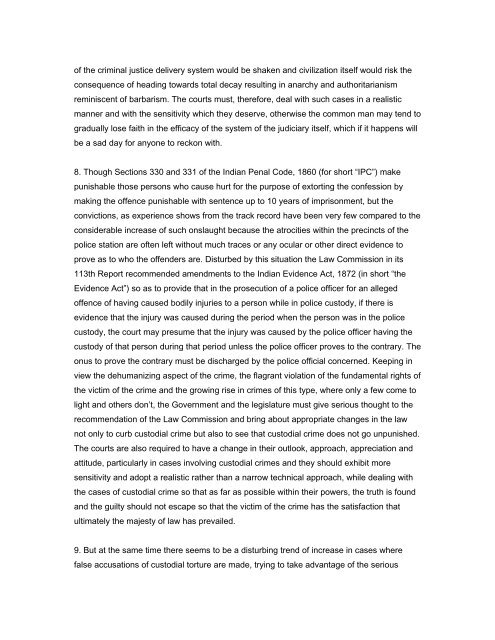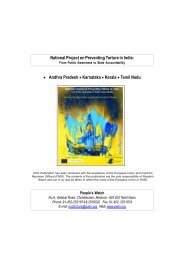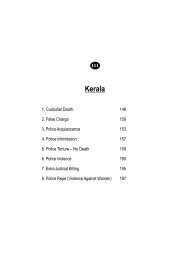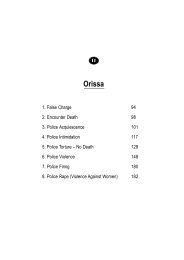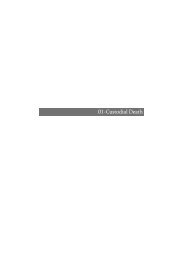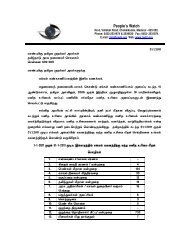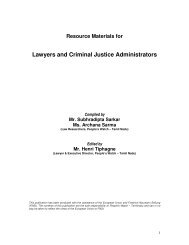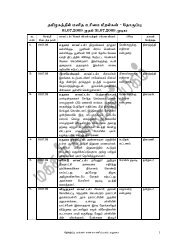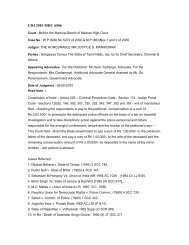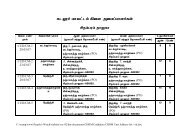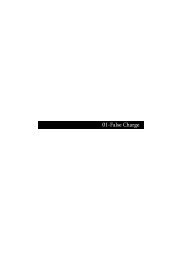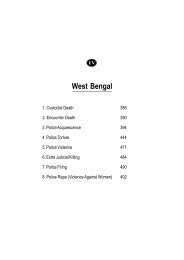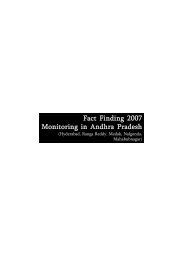Eswaran -Judgment CDJ 2010 MHC 6929.pdf - People's watch
Eswaran -Judgment CDJ 2010 MHC 6929.pdf - People's watch
Eswaran -Judgment CDJ 2010 MHC 6929.pdf - People's watch
You also want an ePaper? Increase the reach of your titles
YUMPU automatically turns print PDFs into web optimized ePapers that Google loves.
of the criminal justice delivery system would be shaken and civilization itself would risk the<br />
consequence of heading towards total decay resulting in anarchy and authoritarianism<br />
reminiscent of barbarism. The courts must, therefore, deal with such cases in a realistic<br />
manner and with the sensitivity which they deserve, otherwise the common man may tend to<br />
gradually lose faith in the efficacy of the system of the judiciary itself, which if it happens will<br />
be a sad day for anyone to reckon with.<br />
8. Though Sections 330 and 331 of the Indian Penal Code, 1860 (for short “IPC”) make<br />
punishable those persons who cause hurt for the purpose of extorting the confession by<br />
making the offence punishable with sentence up to 10 years of imprisonment, but the<br />
convictions, as experience shows from the track record have been very few compared to the<br />
considerable increase of such onslaught because the atrocities within the precincts of the<br />
police station are often left without much traces or any ocular or other direct evidence to<br />
prove as to who the offenders are. Disturbed by this situation the Law Commission in its<br />
113th Report recommended amendments to the Indian Evidence Act, 1872 (in short “the<br />
Evidence Act”) so as to provide that in the prosecution of a police officer for an alleged<br />
offence of having caused bodily injuries to a person while in police custody, if there is<br />
evidence that the injury was caused during the period when the person was in the police<br />
custody, the court may presume that the injury was caused by the police officer having the<br />
custody of that person during that period unless the police officer proves to the contrary. The<br />
onus to prove the contrary must be discharged by the police official concerned. Keeping in<br />
view the dehumanizing aspect of the crime, the flagrant violation of the fundamental rights of<br />
the victim of the crime and the growing rise in crimes of this type, where only a few come to<br />
light and others don’t, the Government and the legislature must give serious thought to the<br />
recommendation of the Law Commission and bring about appropriate changes in the law<br />
not only to curb custodial crime but also to see that custodial crime does not go unpunished.<br />
The courts are also required to have a change in their outlook, approach, appreciation and<br />
attitude, particularly in cases involving custodial crimes and they should exhibit more<br />
sensitivity and adopt a realistic rather than a narrow technical approach, while dealing with<br />
the cases of custodial crime so that as far as possible within their powers, the truth is found<br />
and the guilty should not escape so that the victim of the crime has the satisfaction that<br />
ultimately the majesty of law has prevailed.<br />
9. But at the same time there seems to be a disturbing trend of increase in cases where<br />
false accusations of custodial torture are made, trying to take advantage of the serious


